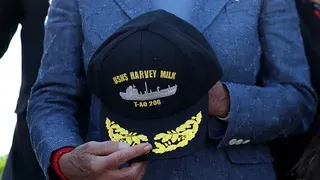September 26, 2012
Retired Battleship Hosts NYC Gala a Year After DADT Repeal
Winnie McCroy READ TIME: 9 MIN.
Celebrities and military top brass gathered aboard the Intrepid Sea, Air & Space Museum on Sept. 18 for "Celebrating Our Heroes: A Tribute to America's Service Members & Veterans," presented by Servicemembers Legal Defense Network (SLDN), OutServe, and the Interbank Roundtable Committee (IRC).
The Intrepid is a decommissioned Navy battleship that is now part of the Smithsonian Museum. It is permanently anchored on a pier in the Hudson River in New York City's Hell's Kitchen neighborhood.
The event marked the first anniversary of the repeal of the discriminatory "Don't Ask, Don't Tell" policy, which mandated that LGBT military personnel could not reveal their sexual orientation and would be dismissed if it were found out. ABC news correspondent Barbara Walters was on hand to honor former Chairman of the Joint Chiefs of Staff Admiral Mike Mullen, who played a significant leadership role implementing an out-gay military policy, which took effect on Sept. 20, 2011.
"In every instance that people have fought for something right, it has enriched every American," Walters said in her introductory remarks. "We fought for something that was right."
Walters praised Mullen for testifying before Congress and the Senate Armed Services Committee on Feb. 2, 2010. His testimony helped GOP members like Scott Brown to join Democrats to repeal the policy that served to drum gay and lesbian service members out of the Armed Forces.
"Admiral, you've done so much to bring comfort and council to thousands of military families, especially those who provide care for our wounded warriors. And your testimony is what helped to turn the tide," said Walters. "So tonight our gay and lesbian service members can not only be open and honest about who you are, you can be recognized for your courage and your service."
The repeal of DADT meant that veterans who were discharged for being gay could now have those discharges corrected, Walters noted. Among those cases was Melvin Dwork, a 90-year-old service member discharged during World War II. With SLDN's help, he is set to receive a retroactive upgrade, changing his discharge to "honorable." This will allow him to finally qualify for Veterans Administration benefits.
For Andrew Espinoza, however, a former Air Force member pressed out of the service for kissing a man on the cheek, this is too little, too late.
"I think that in the past so many people were treated so poorly during the discharge, they turned people's lives upside down investigating them, and they turned people against each other," said Espinoza, an attendee at the Intrepid celebration. "They ruined the lives of good people serving their country on a volunteer basis."
Although the retroactive repeal might not apply to his case, he was still pleased to be on hand celebrating the repeal of a hateful policy.
"It took people like him with the common sense to bring this up in a bill, and it's time," said Espinoza. "It's good to see that in the future, our young Americans who are doing this can be who they want to be while serving their country."
U.S. Military Has Only Improved Since DADT Repeal
On Sept. 20, 2011, the military repealed DADT, a policy implemented on Dec. 21, 1993 by President William J. Clinton.
The policy was intended to prohibit military personnel from discriminating against closeted gay service members, but served to bar openly LGBT people from service, because they "would create an unacceptable risk to the high standards of morale, good order and discipline and unit cohesion that are the essence of military capability."
In his February 2010 testimony before the Senate Armed Services Committee, Mullen said, "I cannot escape being troubled by the fact that we have in place a policy which forced young men and women to lie about who they are in order to defend their fellow citizens. For me, it comes down to integrity -- theirs as individuals and ours as an institution."
Nearly two years later, he stood on the deck of the Intrepid to report that the repeal of the policy was the right thing to do. Rather than compromise unit cohesion, as anti-gay activists predicted, it has actually improved military morale.
"Over the course of the year there have been no negative effects of the bill," said Mullen. "Everything is still working, which shows that in the past year since the repeal, nothing bad has come of it."
Human Rights Campaign former Executive Director Elizabeth Birch echoed this sentiment. The repeal of DADT marked a huge improvement in the military, she said.
"This change was made even though there were many voices in our society, particularly in our political system, who thought it would be destructive for the military, that unit cohesion would collapse, that the effectiveness of the organization would collapse," said Birch.
"Nevertheless, Admiral Mullen and so many others with his testimony on Capitol Hill was able to convince our elected leaders that it was the right thing to do, and it was also safe to do it," she continued. "A year later we're here to mark time and say as a nation we took the risk, we implemented the change, and the military is still together, still a powerful institution, and there's been no real problems whatsoever. Our troops were ready for this change, even if our political leaders were not."
Mullen said that it was easy to stand up for what he believed in, and was grateful to the soldiers, sailors, airmen, Marines and Coast Guard here and across the world for their service.
Among them were Zoe Dunning, a retired Navy captain who was the only pre DADT-repeal service member to win a court case that allowed her remain on active duty. Also on hand was Eric Alva, an openly gay former Marine Staff Sergeant and the first casualty of war in Iraq.
"I was glad to be there and represent the entire United States military at a time when it made such a difference in so many lives," said Mullen. "Many of you have been on this journey for a long time, and for many of you it has been a very difficult time. But if was those of you who paved the way for thousands of others who will come in your wake. And that future, our military, our ability to serve no matter who we are, is such a gift to America as they look to the challenges we have for the future."
The victory was sweet, even if it came only a year before Burt Gillot, protocol officer for Adm. Mullen, retired.
"In 2010, I was standing at the copy machine in my office when on TV Adm. Mullen was speaking about DADT repeal. It was then when I heard those famous words, 'It is my personal belief that allowing gays and lesbians to serve openly would be the right thing to do.' I stood there in shock and was overwhelmed at the notion," said Gillot.
"Never did I believe I would hear something like that in my career, even in my lifetime, from the highest-ranking person in our military, some one I truly respected," he said. "I was tired of lying, tired of worrying if I'd be outed, wrenched in fear during routine security investigations. Worried that the next phone call from a commander would eject me from the military for being gay."
Gillot said that later that day, another officer started loudly complaining about the morality problem in this country, adding that he was glad he was retiring before the repeal could happen. Gillot regretted that the man left before he had the opportunity to tell him that he had been serving alongside gays and lesbians his entire career.
"On the day DADT was repealed Secretary [of Defense Leon] Panetta and Adm. Mullen held press conference in Pentagon press room," he said. "In a room full of staff and security, he asked me why I had attended the briefing. At that moment, I confessed to him and everyone around, I'm gay, too."
Celebrating a Hard-Won Victory
In his closing comments, Mullen noted that he was glad to live in a great time of change and to celebrate the repeal of DADT for thousands of courageous young people who have made such a difference. But he also noted that a major victory was having a military that could meet the challenges of our future. "We can put this behind us and get on with much more important things," he said.
New York City's out-gay city council president (and top candidate to succeed Michael Bloomberg as mayor) noted that she came from a family with a history of military service. "We don't always have victory in our fights, so it is great to take a moment and recharge our batteries for the battles ahead, and that's what today is about," she said. "I know what it means for people to be able to fight for their country. The photo of the sailor kissing the girl in Times Square; to think that our community could be left out of that is terrible. I'm so glad they repealed DADT."
Birch agreed, saying that in 30 years, the two landmark photos of this will be the signing of the repeal by President Barack Obama, and this event on the Intrepid.
"The reason it's so important to come together and mark our moments in history is that we rarely do it," Birch said, "and we have to mark our history, and celebrate it, because we spend so much time crawling and fighting for each incremental change, that when the most powerful industrial military complex in the world takes action that makes everything else inevitable."
Miss America Kate Shindle opened the event with the National Anthem. A troupe of Broadway performers did a spirited dance to "Boogie Woogie Bugle Boy." Closing the program were "Wicked" cast members Katie Rose Clarke and Julia Murney, who sang "For Good." The event raised $700,000 for wounded veterans.
For more information, visit sldn.org
Winnie McCroy is the Women on the EDGE Editor, HIV/Health Editor, and Assistant Entertainment Editor for EDGE Media Network, handling all women's news, HIV health stories and theater reviews throughout the U.S. She has contributed to other publications, including The Village Voice, Gay City News, Chelsea Now and The Advocate, and lives in Brooklyn, New York.






